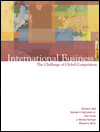Appreciate the complexity of the legal forces that confront international business.
International business is affected by many thousands of laws and regulations issued by states, nations, and international organizations. Some are at cross-purposes, and some diminish the ability of firms to complete with foreign companies. Understand that many taxes have purposes other than to raise revenue.
Certain taxes have purposes other than to raise revenues. For example, some aim to redistribute income, discourage consumption of certain products, encourage use of domestic goods, or discourage investment abroad. In addition, taxes differ from country to country. Tax treaties, or conventions, between countries can affect decisions on investment and location. Discuss enforcement of antitrust laws.
The United States and the European Union enforce antitrust laws extraterritorially. This is a concern for companies operating in many countries. Appreciate the risk of product liability legal actions, which can result in imprisonment for employees for fines for them and the company.
Product liability refers to the civil or criminal liability of the designer or manufacturer of a product for injury or damages it causes. In several ways, product liability is treated differently in the U.S. legal system than in other countries. For example, only in the United States does one find lawyers’ contingency fees, jury trials of these cases, and punitive damages. Although the principle of strict liability has been adopted in Europe, defendants are permitted to use state-of-the-art defenses and countries can put a cap on damages. Product liability is virtually unknown in Japan. Recognize the importance of being aware of peculiarities of local foreign law.
Miscellaneous laws in host countries can trip up foreign businesspeople or tourists. Charges can range from not carrying an alien registration card to narcotics possession. Understand contract devices and institutions that assist in interpreting or enforcing international contracts.
International contracts should specify which country’s law and courts should apply when disputes arise. The UN’s CISG and the EU’s Rome Convention have established rules for solving contract disputes. Arbitration is an increasing popular solution. Anticipate the need and methods to protect your intellectual property.
Patents, trademarks, trade names, copyrights, and trade secrets are referred to as intellectual properties. Pirating of those properties is common and is expensive for their owners. The UN’s World Intellectual Property Organization (WIPO) was created to administer international property treaties, as was TRIPS, a WTO agency with a similar purpose. Recognize how industrial espionage affects international business.
Industrial espionage is one company’s attempt to steal another company’s trade secrets, a crime punishable in some countries by fines or imprisonment. | 



 2002 McGraw-Hill Higher Education
2002 McGraw-Hill Higher Education